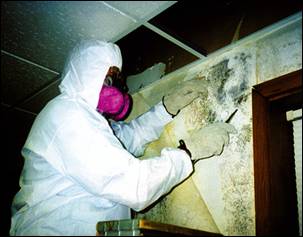Indoor Air Quality
Indoor Air Quality (IAQ) consulting involves the recognition, evaluation, and control of environmental factors arising in or from the workplace or home that may cause sickness, impaired health and well being, or significant discomfort among occupants. IAQ is becoming more of an issue for people of all ages. The elderly are particularly at risk to problems with the indoor air. Many factors contribute to problems with IAQ, and it is often a combination of several factors that cause a problem. Common contributors include mold, animal dander, dust mites, bacteria, insects, rodents, and volatile organic compounds (VOCs). While not all of these may occur at the same time in the same building, several of them share moisture as a common factor. Certified Environmental Services (CES) maintains six certifications in IAQ issues of concern. The IAQ professionals at CES can also provide radon, lead-in-drinking water and IAQ Risk Assessment services.
Mold Services
Benefits:
-
- Having CES work to protect the client’s interests during remediation, they are ensured that the job is done right
- Our certified IAQ consultants’ #1 goal is to protect and improve the health of building occupants

Mold is increasingly becoming a problem in the United States. Molds generate tiny spores to reproduce and move through the air continually. When mold spores land on a damp spot indoors, they may begin growing and digesting whatever they are growing on in order to survive. When excessive moisture or water accumulates indoors, mold growth will often occur, particularly if the moisture problem remains undiscovered.
The key to mold control is moisture control. It is important to dry water damaged areas and items within 24-48 hours to prevent mold growth. If mold is a problem, clean up the mold and get rid of the excess water or moisture. It is also important to fix leaky plumbing or other sources of water. Mold must be washed off hard surfaces with detergent and water, and dried completely.
Certified Environmental Services (CES) is experienced at providing mold services to extended care facilities, schools, municipalities, and the hospitality industry. We will provide project management oversight to local, experienced, mold remediation companies, in order to protect our client’s interests and make sure the remediation is done right. Upon completion of the project, CES will conduct confirmation sampling to ensure the level of spores and particulate matter is within acceptable limits.
Operations and Maintenance Plans
Benefits:
-
- Gives facilities the tools to manage their own small water intrusion and mold problems.
- Provides information on how to avoid and manage risk associated with mold.
- Provides training to on-site staff for the identification, prevention, and remediation of water intrusion and mold growth incidents.
An Operations and Maintenance (O&M) Plan is a systematic guideline of what to look for at a facility and what to do if a problem with moisture or mold arises. An integral part of the plan is a guide of safe, practical, and cost-effective methods to inspect for and remediate the presence of water-damaged materials and to limit the occurrence of water intrusion in order to maintain a healthy IAQ. By knowing what to look for, and what to do if a problem happens, facility staff and management will be able to minimize the number and severity of moisture and mold problems. All of this contributes to a better indoor air quality, which, in turn, promotes better health.
First, a complete inspection of the facility is performed by our qualified consultants. This allows the addressing of immediate issues and the determination the specific needs of the facility. Next, we prepare an O&M Plan tailored to the facility. We then allow the client to review it and provide input on how to best suit it to their needs, making it as practical as possible. Once complete, we train management and/or maintenance staff on the ASTM Standard E2418-06 and on how to implement the O&M Plan. Finally, the plan is reviewed and updated by CES on an annual basis to keep it as current as possible.
O&M Plan and Mold Remediation Project – Sun City, Arizona
CES personnel provided project management oversight and O&M Plan development for an extended care facility in Sun City, Arizona. The scope of work included identification of sources of water intrusion, oversight of remediation, and confirmation sampling. CES worked alongside a general contractor during the remodeling phase of the project, and directed a mold remediation company to perform the remediation in impacted areas without having to evacuate adjoining areas. Once complete, CES prepared an O&M Plan for the entire facility, including those areas not remediated, and trained their maintenance and environmental services staff on how to incorporate the IAQ-friendly processes into their daily routine.
Training Programs
Benefits:
-
- Can be custom-tailored to meet the needs of each facility.
- Reduces the overall risk of having a serious water intrusion or mold growth incident.
- Teaches on-site staff how to reduce the severity of a water intrusion or mold growth incident, which can save the facility precious time and money.
CES offers a Mold First Responder training course to facilities to train their staff on how to identify potential water intrusions and mold growth, remediate small jobs, and follow appropriate procedures to protect worker and resident health and safety. Topics covered include, but are not limited to Basic Principles, Inspection Techniques, Mold and Water Intrusion Identification, Scopes of Work, Personal Protective Equipment, Mold Remediation Techniques, and Documentation.
In addition to this program, CES can also customize or develop any IAQ training program to meet the needs of a facility. This can be as basic as general information for environmental services staff or as comprehensive as remediation techniques for maintenance staff or liability reduction for executives. The overall goal is to teach facilities to be as self-sufficient and knowledgeable as possible and to evaluate when it is necessary to call industry professionals.